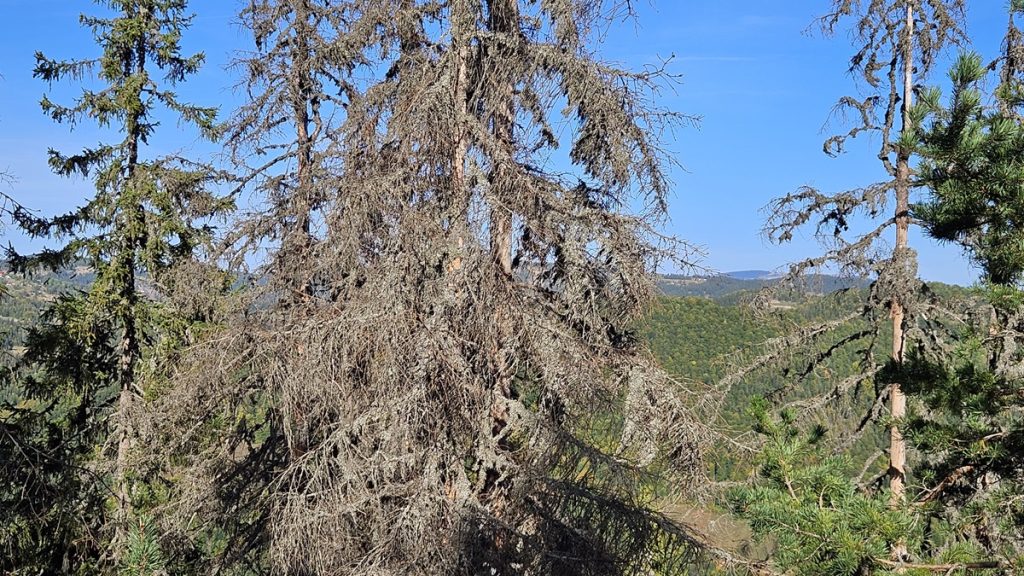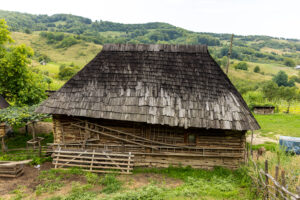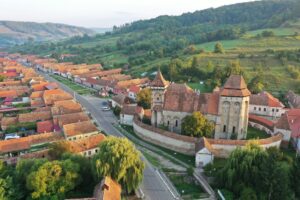Forests and Bark Beetle (Ips) Attacks
The bark beetle causes significant economic losses and has a negative impact on forest biodiversity. Moreover, bark beetle outbreaks affect forest structure and composition, nutrient cycling, erosion processes, reduce carbon absorption, and increase the risk of fires.

In this context, WWF-Romania has proposed the development of remote sensing techniques for the early detection of spruce stands affected by bark beetles, thereby contributing to effective decision-making for the responsible management of forests and protected areas.
As part of the project, the University of Agricultural Sciences and Veterinary Medicine Cluj-Napoca conducted research on early (green) detection possibilities for bark beetle attacks using remote sensing and GIS techniques. These techniques use UAS (drones) equipped with multispectral sensors, and the methodologies were adapted to the specific characteristics of Romania's forests.
The interpretation of images obtained through remote sensing could be used to identify forest stands affected by bark beetle outbreaks based on the distinct reflectance of tree canopies in physiological decline. Such a technique is already used for monitoring agricultural crops and could be calibrated for the investigation of biological forest pests. This tool could provide efficient results and potentially be used at a national or European level.
Noutăti
Fii la curent cu ultimele articole despre păduri

Refacerea naturii din Delta Dunării – posibilă doar împreună cu oamenii
de Ciprian Pîrăianu* „Omul este cea mai amenințată specie din Delta Dunării.” Aceste cuvinte ale unui pescar local exprimă perfect ceea ce se întâmplă în Delta Dunării din România. Gazdă a peste 5.000 de specii de plante și animale, această zonă umedă este unul dintre cele mai bogate locuri pentru

Cum poate o comunitate rurală să-și îmbunătățească confortul, sănătatea și viitorul energetic?
Încălzirea locuinței rămâne o provocare majoră, mai ales pentru persoanele vârstnice și pentru gospodăriile cu venituri reduse. Costurile tot mai ridicate ale energiei, locuințele vechi și lipsa unor alternative moderne de încălzire creează un cumul de dificultăți care afectează direct calitatea vieții. Comuna Lăpuș, din județul Maramureș, este un exemplu

EUKI BioJust: tranziție energetică justă pentru gospodăriile vulnerabile din mediul rural
În multe comunități din Europa Centrală și de Est, încălzirea locuințelor rămâne o provocare majoră. Gospodăriile vulnerabile continuă să depindă de lemn de foc și alte forme de biomasă solidă, într-un context marcat de sărăcie energetică, locuințe slab izolate și acces limitat la soluții eficiente de încălzire. Această realitate generează

Transylvanian Highlands, part of the Danube Wood(s) Route. Where wood shapes the landscape
RO The Transylvanian Highlands have been integrated into the Danube Wood(s) Route. The new video produced by WWF-Romania highlights a region where nature and culture come together naturally. In addition, the area is featured in the official route web app and included in the European promotional film for the project.

Colinele Transilvaniei, parte din Danube Wood(s) Route. Unde lemnul modelează peisajul
EN Colinele Transilvaniei au fost integrate în Danube Wood(s) Route – Ruta Culturală a Lemnului, iar noul video realizat de WWF-România aduce în prim-plan o regiune în care natura și cultura se întâlnesc firesc. În plus, regiunea este prezentată în aplicația oficială a rutei și este inclusă în filmul european de promovare al

Maramures in the Danube Wood(s) Route. A New Video Dedicated to the Wood Civilization
RO Maramures now has a dedicated video within the Danube Wood(s) Route project. Produced by WWF-Romania, it highlights the local specificity of the “wood civilization.” In addition, the region is featured in the official web application of the route and included in the European promotional film of the project. The
